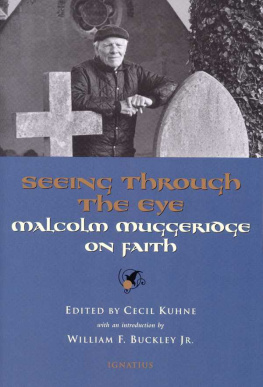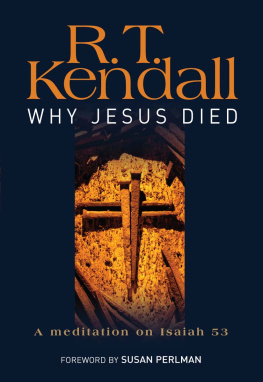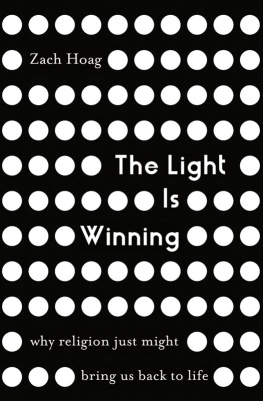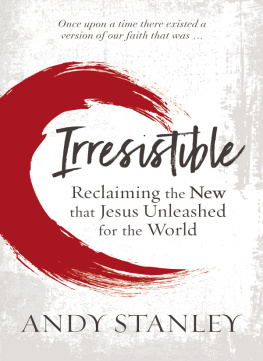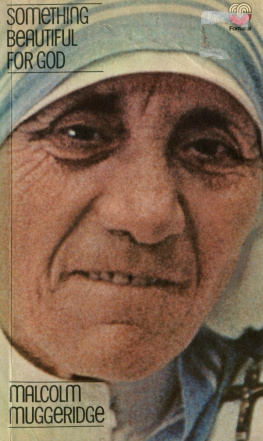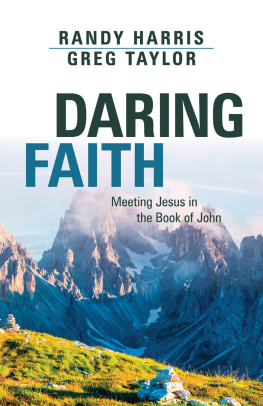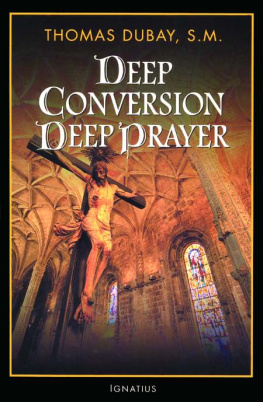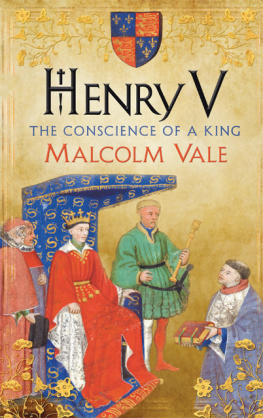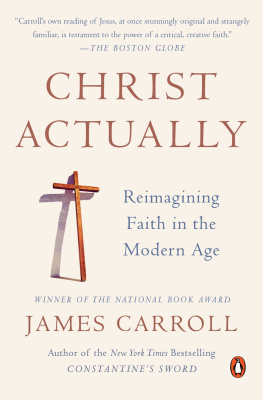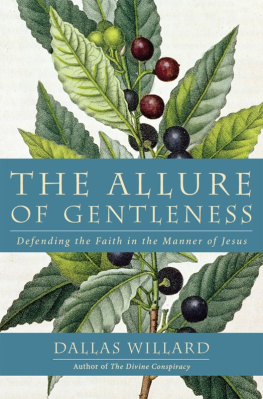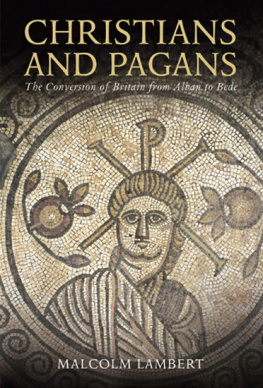SEEING THROUGH THE EYE
This lifes dim windows of the soul
Distorts the Heavens from pole to pole,
And leads you to believe a lie
When you see with, not through, the eye.
William Blake
SEEING THROUGH
THE EYE
MALCOLM MUGGERIDGE
ON FAITH
EDITED BY CECIL KUHNE
INTRODUCTION BY
WILLIAM F. BUCKLEY JR.
IGNATIUS PRESS SAN FRANCISCO
Cover photograph:
Malcolm Muggeridge
Courtesy of the Malcolm Muggeridge Collection,
Wheaton College (IL).
Cover design by Roxanne Mei Lum
2005 Ignatius Press, San Francisco
All rights reserved
ISBN 978-1-58617-068-4 (PB)
ISBN 1-58617-068-6 (PB)
ISBN 978-1-68149-684-9 (EB)
Library of Congress Control Number 2004107668
Printed in the United States of America
CONTENTS
PART ONE
WRITTEN WORDS
PART TWO
SPEECHES AND SERMONS
PART THREE
INTERVIEWS
PREFACE
In his candid autobiography, Chronicles of Wasted Time , Malcolm Muggeridge recounted the evening he tried to commit suicide by drowning. He had swum into the surf near Mozambiques Loureno Marques, and looking back, noted that the lights of the town had grown dim. He started to flail, and then began to cry out for help.
In some mysterious way it became clear to me that there was no darkness, only the possibility of losing sight of a light which shone eternally; that our clumsy appetites are no more than the blind reaching of a newly born child after the teat through which to suck the milk of life; that our sufferings, our affliction, are part of a dramaan essential, even an ecstatic, partendlessly revolving round the two great propositions of good and evil, of light and darkness.
The next day Muggeridge reflected: The bars of the window, as I looked more closely, took on the form of a Cross. He had reached a threshold that would lead to a spiritual quest for lifes meaning, and before dying in 1990 would spend the last twenty years of his life telling others of his transforming relationship with Jesus Christ.
In a long and distinguished career as one of Englands finest journalists, Muggeridge served as correspondent for the Guardian and Daily Telegraph and as editor of Punch , and in these roles he moved freely about the world, living in India, Egypt, the Soviet Union, and Washington, D.C. Known for his quick wit and sharp tongue, he became a popular, albeit controversial, commentator on the affairs of the day. Leaning back in his chair, with that inimitable glint in his eyes, Muggeridge could pierce the most elaborate faadeand do so with gentle humor. His criticism of the monarchy and all manner of power was notable, as he lambasted the likes of such cultural icons as H. G. Wells, George Orwell, Bertrand Russell, George Bernard Shaw, and D. H. Lawrence. Muggeridge was never one to shirk controversy.
Born in 1903, Muggeridge was raised in a home of Fabian Socialists, and his father, whom he adored, was a vocal proponent of utopianism and later elected to Parliament. The young Muggeridge attended Cambridge and graduated in 1924, but he found the experience less than satisfying: Cambridge, to me, was a place of infinite tedium; of afternoon walks in a damp, misty countryside; of idle days, and foolish vanities, and spurious enthusiasms. His own Socialist leanings, which he adopted from his father, changed dramatically when he saw firsthand the workings of Communism in the Soviet Union, and he felt compelled to take a laboring oar against the tide of the press corps, pointing to the sham of the system they were extolling. I felt furious about the whole experience, as though I had been personally cheated, and poured out my righteous indignation and hurt vanity in a series of articles as bitter and satirical as I knew how to make them. During the Second World War, Muggeridge joined the Army Intelligence Corps and served in Mozambique, Italy, and France, before resuming his illustrious career as columnist and social commentator.
Muggeridge was never clear in his writings about exactly when he became a Christian. In some of his writings, he suggests that he was a believer as early as his college days, and in others he seems to say that he did not become a true follower of Christ until he was in his sixties. The late 1960s, however, were pivotal years in this process, and it was then that he made public his belief in Christ. Saint Mugg, as he was affectionately called, was clear in his new-found faith: It is the truth that has died, not God, and Jesus was God or he was nothing. To Muggeridge, God was reality and the world, fantasy: Built into life is a strong vein of irony for which we should only be grateful to our Creator. It helps us to find our way through the fantasy that encompasses us to the reality of our existence. God had mercifully made the fantasiesthe pursuit of power, of sensual satisfaction, of money, of learning, of celebrity, of happinessso preposterously unrewarding that we are forced to turn to him for help and for mercy. Only a self-confessed libertine like Muggeridge could write words of such force and power, as he did in his book Jesus Rediscovered :
Many people have asked me how it was that I came ultimately to be convinced that Christ was the answer. It was because in this world of fantasy in which my own occupation has particularly involved me, I have found in Christ the only true alternative. The shadow in the cave is like the media world of shadows. In contradistinction, Christ shows what life really is, and what our true destiny is. We escape from the cave. We emerge from the darkness and instead of shadows we have all around us the glory of Gods creation. Instead of darkness we have light; instead of despair, hope; instead of time and the clocks ticking inexorably on, eternity, which never began and never ends and yet is sublimely now.
The result of this revelation was expressed in his changed relationship with others: All I can claim to have learnt from the years I have spent in this world is that the only happiness is love, which is attained by giving, not receiving; and that the world itself only becomes the dear and habitable dwelling place it is when we who inhabit it know we are migrants, due when the time comes to fly away to other more commodious skies.
Muggeridge later went on to produce a BBC television series and book ( Something Beautiful for God ) about Mother Teresa, which were credited with introducing her works of charity to the West. In turn, Mother Teresa was influential in Muggeridges spiritual journey. Like many Christians, his path was a gradual one, with increasing maturity and insights as he spent more time in the Scriptures and God illuminated his heart. He later became an outspoken critic of abortion and euthanasia and eventually converted to Catholicism (in 1982) because of the Churchs stand on those issues.
When in 1973 he resigned as rector of Edinburg University rather than approve the students request for distribution of pot and pills, Muggeridge noted that these young peoplein whom society had lavished its wealth in the hope that they would someday lead progress and produce great work of artwere degrading themselves with the resort of any old, slobbering debauchee anywhere in the world at any timeDope and Bed. He said in his resignation address that the highest aspiration of man is to see God, and that purity of heartnot indulgence of the senses or enlightened thinkingis the key to knowing God and unlocking the mystery of life. Amazingly, not a single public statement was uttered in his behalf.
Muggeridges favorite quotewhich he used oftenwas one from William Blake:
This lifes dim windows of the soul
Distorts the Heavens from pole to pole,
And leads you to believe a lie
When you see with, not through, the eye.
Muggeridge clearly saw through the eye. The former archbishop of Sydney, Doctor Marcus Loane, called him the most significant layman since C. S. Lewis, highly intelligent and an outstanding apologist for Christ. Reverend John Stott described him as a true prophet of the twentieth century... a voice crying in the wilderness.
Next page
